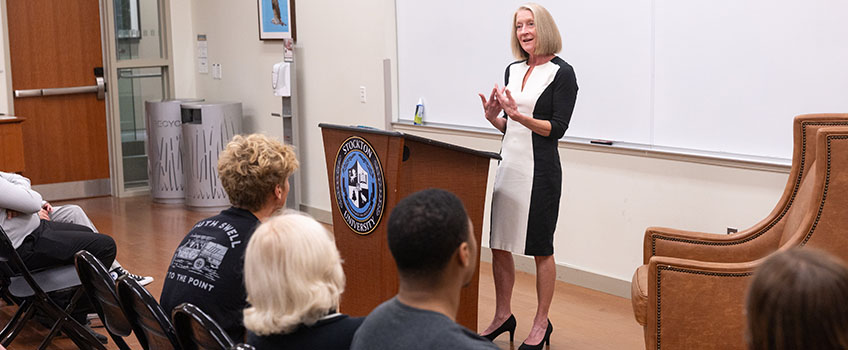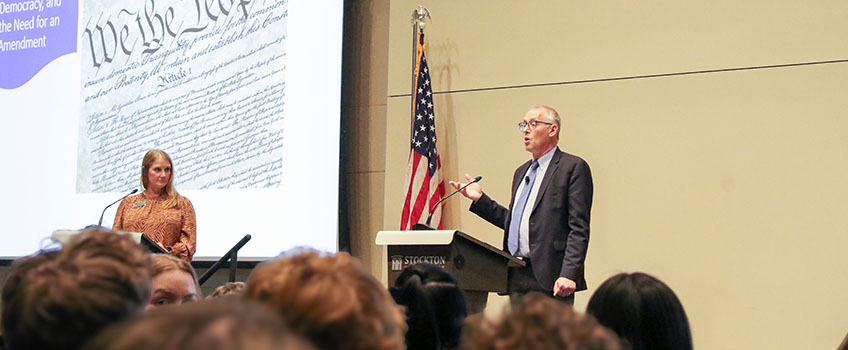Constitution Day Speaker Talks Rule of Law

Constitution Day speaker Mary McCord held a Q&A session with Political Science students in advance of her keynote lecture, which centered on the rule of law.
Galloway, N.J. – The rule of law as a core democratic principle was the focus of Stockton University’s annual Constitution Day lecture Sept. 29 featuring writer and scholar Mary McCord.
For two decades, Stockton has commemorated the signing of the United States Constitution with a keynote address each fall featuring prominent legal scholars, practitioners, or journalists.
“Each year, we gather to reflect on the enduring principles of our Constitution, and to examine some of the challenges facing our democracy. Because democracy is not a spectator sport,” said Alyssa Maurice, assistant director of the William J. Hughes Center for Public Policy at Stockton.
“We are gathered just 55 miles from where it all began, Independence Hall in Philadelphia, where on Sept.17, 1787, a group of delegates signed the United States Constitution,” Stockton President Joe Bertolino said. “That moment marked the start of a grand and still unfinished project. The effort to form a more perfect union.
“The Constitution's checks and balances have carried this country through seasons of prosperity and through storms of crisis and division. That's why events like this matter. Because learning doesn't only happen in the classroom. It happens when we come together across differences. To reflect, to listen, to engage with the systems that shape our lives,” Bertolino said in introducing McCord.
Throughout her lecture, McCord, who is Executive Director of the Institute for Constitutional Advocacy and Protection (ICAP) and a Visiting Professor of Law at Georgetown University Law Center, discussed the erosion of due process and the rule of law in current times.
“In America, it's about our individual rights and liberties, that the government cannot deprive us of without due process of law, without a notice and an opportunity to be heard before they take property, our liberty, etc. Whereas those who live in post-authoritarian states, in particular, they view the rule of law as what stands between democracy and dictatorship.
“It's the luxury of living in a country that has largely avoided systemic threats to democratic institutions that has allowed us to focus on individual due process rights like that,” McCord said.
“But that is not the case any longer, because the pillars of our democratic foundation are being eroded, the pillars of the rule of law. We can't just afford to focus on individual rights and due process under the assumption that our institutions of governance—the legislature, the judiciary, the executive—will hold, will endure.”
McCord encouraged the audience to share the message about the rule of law through action including calling elected officials, voting and running for elected office.
“We can collectively stop the erosion of the rule of law. It won't be overnight, but it can be done. It has happened in other countries. And if we are complacent, and we think that America is too exceptional to go down the path of other countries, we are wrong,” she said.
“Americans cannot afford to look at each executive action individually, and maybe dismiss it as inconsequential, or not worth their time because it doesn't impact them personally.”
"We are pleased to be able to commemorate Constitution Day each year with this address that allows our campus community to learn more about our democracy and the legal foundations that inform it,” said Claire Abernathy, co-chair of the Constitution Day Planning Committee and associate professor of Political Science.
“It is my hope that we can use this unifying framework of the rule of law that Professor McCord provided in this year's keynote to understand the executive actions being issued by the Trump administration and their implications for core democratic principles," Abernathy said.
Prior to the keynote lecture, McCord met with nearly 40 Political Science students for a question-and-answer session on the Constitution and public policy.
At ICAP, McCord leads a team that brings constitutional impact litigation at all levels of the federal and state courts across a wide variety of areas, including First Amendment rights, immigration, criminal justice reform, separation of powers, combating political violence, and protecting democratic processes.
Story by Stacey Clapp
Constitution Day Speaker Explores Voting Rights
September 25, 2024

Galloway, N.J. — The United States Constitution does not guarantee individuals the right to vote. That came as a surprise to the crowd at the 19th annual Constitution Day lecture Tuesday in the Campus Center Event Room.
Holding one of the pocket copies of the U.S. Constitution distributed to all attendees, election law expert Richard L. Hasen challenged anyone to show him where the Constitution gives Americans voting rights.
“Where we live tells us a big part of how protected our right to vote is. There is no affirmative right to vote in the Constitution,” Hasen said, noting America’s founders made voting a states’ right.
Hasen delivered the annual keynote address based on his book “A Real Right to Vote: How a Constitutional Amendment Can Safeguard American Democracy.” Hasen is the Gary T. Schwartz Endowed Chair in Law, Professor of Political Science, and Director of the Safeguarding Democracy Project at UCLA School of Law. He also writes the Election Law Blog, which tracks current developments in voting rights and access around the country.
“As an institution of higher education, it is our responsibility to provide the setting for democratic participation; to offer opportunities for our students and our community to converse with those with differing viewpoints and life experiences,” Stockton President Joe Bertolino said in introducing Hasen. “The Stockton community is one that values inclusivity, providing an environment where all voices can be heard.”
--Story by Stacey Clapp
--Photos by Lizzie Nealis


